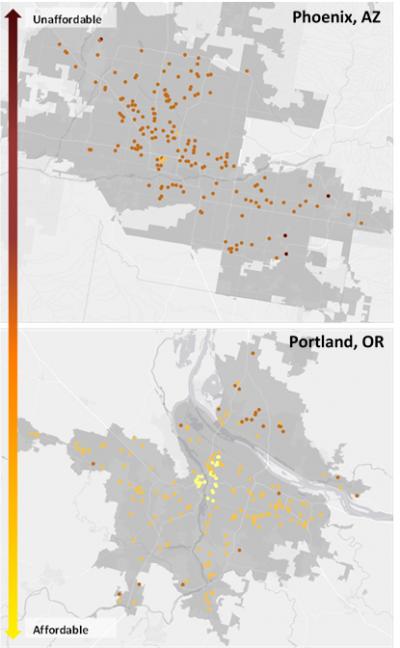
Watch video
View slides
This webinar reports findings from a NITC study which assessed the affordability of HUD rental assistance properties from the standpoint of transportation costs. HUD housing is, by definition, affordable from the standpoint of housing costs; there are limits on the amounts renters can be required to pay. However, there are no such limitations on transportation costs, and common sense suggests that renters in remote locations may be forced to pay more than 15 percent of income, a nominal affordability standard, for transportation costs.
Using household travel models estimated with data from 15 diverse regions around the U.S., researchers estimated and summed automobile capital costs, automobile operating costs, and transit fare costs for households at more than 18,000 HUD rental assistance properties. The mean percentage of income expended on transportation is 15 percent for households at the high end of the eligible income scale. However, in highly sprawling metropolitan areas, and in suburban areas of more compact metropolitan areas, much higher percentages of households exceed the 15 percent threshold. This suggests that locational characteristics of properties should be considered by HUD when establishing eligibility for rental assistance subsidies.
This 60-minute webinar is eligible for one hour of training which equals 1 CM or 1 PDH. NITC applies to the AICP for Certification Maintenance credit for each webinar. We will provide an attendance certificate to those who document their professional development hours.
Reid Ewing, Ph.D., is a professor of city and metropolitan planning at the University of Utah, associate editor of the Journal of the American Planning Association, and columnist for Planning magazine, writing the bi-monthly column Research You Can Use. Earlier in his career, he was director of the Voorhees Transportation Center at Rutgers University, research professor at the National Center for Smart Growth, state representative from northwest Tucson, and analyst at the Congressional Budget Office. He holds master’s degrees in Engineering and City Planning from Harvard University, and a Ph.D. in Urban Planning and Transportation Systems from the Massachusetts Institute of Technology.
